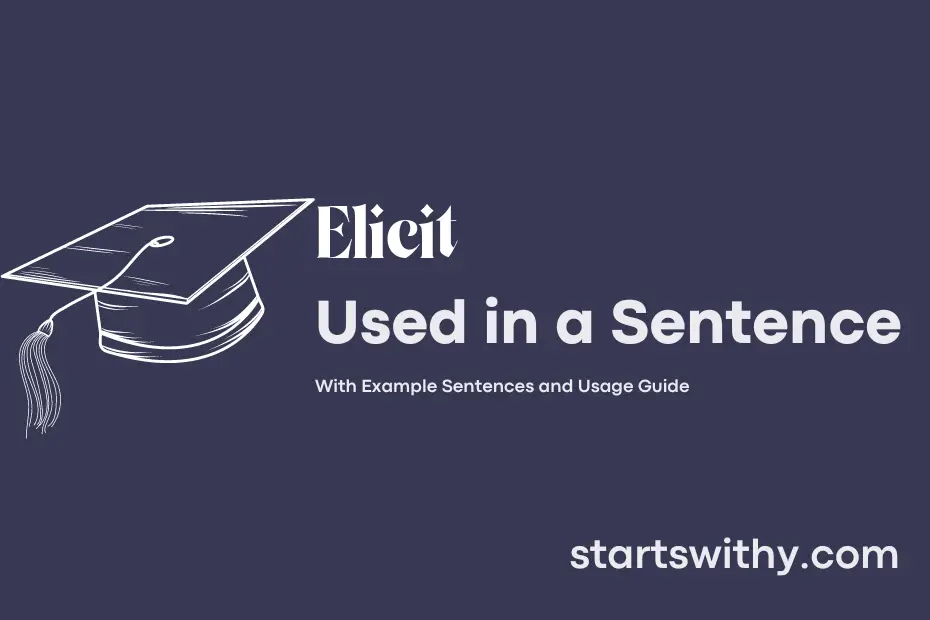Have you ever struggled to provoke a specific reaction or response in a conversation? This is where the term “elicit” comes into play. Eliciting means to draw out, evoke, or extract a particular response, information, or reaction from someone through skillful questioning or other methods.
In various contexts, from interviews to surveys to therapy sessions, the ability to elicit the desired information or emotions can greatly impact the outcome. Understanding how to elicit effectively can lead to clearer communication, deeper connections, and successful interactions in both personal and professional settings.
7 Examples Of Elicit Used In a Sentence For Kids
- The teacher asked us questions to elicit our answers.
- Can you help me elicit the correct colors for the rainbow?
- We used pictures to elicit feelings of happiness.
- Let’s play a game to elicit the names of different animals.
- Use your imagination to elicit a story from your friends.
- The music helped elicit memories of a fun party.
- Draw a picture that will elicit excitement and joy from others.
14 Sentences with Elicit Examples
- During group discussions, it is important to elicit different viewpoints to enrich the conversation.
- The professor used probing questions to elicit thoughtful responses from the students.
- The research project aimed to elicit feedback from college students about their campus experience.
- The survey was designed to elicit opinions on campus food options from the student body.
- The debate competition encouraged participants to elicit strong arguments to support their viewpoints.
- The psychology experiment sought to elicit emotional responses from the participants.
- The career workshop was successful in eliciting interest from a large number of students.
- The guest speaker’s presentation was designed to elicit questions from the audience.
- The quiz was challenging but managed to elicit a competitive spirit among the students.
- The workshop on stress management techniques aimed to elicit self-reflection from the attendees.
- The subject matter expert was able to elicit valuable insights from the students during the seminar.
- The intern’s project presentation elicited a positive response from the professors.
- The mentor’s guidance helped the student elicit valuable information for their research paper.
- The interactive workshop utilized various activities to elicit participation and engagement from the students.
How To Use Elicit in Sentences?
Elicit means to draw out or evoke something, such as a response, reaction, or information. When using elicit in a sentence, follow these guidelines:
-
Subject-Verb-Object: Construct your sentence with a subject performing an action that leads to eliciting a response or information from an object. For example, “The detective’s questions managed to elicit crucial information from the witness.”
-
Use Proper Context: Ensure the context of your sentence aligns with the meaning of elicit. This word is commonly used in situations where a reaction or response is provoked intentionally.
-
Choose Appropriate Words: When using elicit, choose appropriate words to convey the action of drawing out a response. Words like “draw out,” “evoke,” “extract,” or “bring forth” can be good alternatives.
-
Be Clear and Concise: Make sure your sentence is clear, concise, and accurately reflects the meaning of elicit. Avoid using complex sentence structures that might overshadow the main action of drawing out.
-
Practice Using Synonyms: To become more comfortable with using elicit, practice incorporating its synonyms in sentences to strengthen your understanding and application of the word.
By following these guidelines and practicing using elicit in various contexts, you can effectively incorporate this word in your writing and speech to communicate more precisely and vividly.
Conclusion
In this article, we explored various examples of sentences with the keyword “elicit.” These sentences demonstrated how the word “elicit” is used to describe the act of drawing out a reaction, response, or information from someone or something. Through these examples, we learned how “elicit” is commonly used in contexts where a specific reaction or response is desired.
Understanding how to use “elicit” in a sentence can help improve communication skills and facilitate more effective interactions. By being mindful of the nuances of this word, individuals can better convey their intentions and elicit the desired outcomes in various situations. Mastering the usage of “elicit” can enhance one’s ability to elicit emotions, responses, and information effectively.



